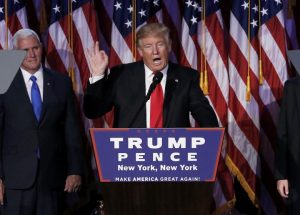For all that a great democratic exercise was under way in the United States for 18 turbulent months, there has been more talk of political dynasties this election than one might have thought proper for a republic. Hillary Clinton was considered part of an existing dynasty, her husband having served as America’s 42nd president. Despite her defeat, speculation will continue that the couple’s daughter, Chelsea, may formally enter politics herself. And even though Donald Trump is a businessman who hasn’t previously sought elected public office, there has been more than one suggestion that his audacious win will found another dynasty. It was striking in the last days of the campaign that a Trump-supporter at a rally in Marietta, Georgia told The Economist correspondent she hoped one of the candidate’s children would “reign” after their father.
Tellingly, Donald, Mr Trump’s oldest son, has said he might run for office. And Eric, one of his other sons, recently tweeted along with a photograph en famille: “On behalf of the entire family, we would truly be honoured to have your vote!”
But the US is not the only democracy where dynasties increasingly seem a feature of political life. Just last week, Canada’s prime minister Justin Trudeau marked a year in the job, one that his father previously held. There’s nothing wrong with that, of course, but is the business of western politics fundamentally changing?
No, not really. It’s worth remembering that when the two candidates for the 2016 US presidential election were finally chosen by their respective parties, a member of an existing political dynasty didn’t make the cut. Jeb Bush, whose father was America’s 41st president and brother the 43rd, was forced to drop out of the Republican primary because of tepid voter enthusiasm. That says something about the power of dynastic succession. There are expectations and there is reality. Both must be aligned if power is to stay within a family.
But the dynasty has always had a prominent place in US politics for all that America was founded in rebellion against hereditary power. American schoolchildren know that two of their nation’s early presidents — John Adams, the second president, and John Quincy Adams, the sixth — were father and son. Benjamin Harrison, the 23rd president, was grandson of the ninth, William Henry Harrison. James Madison, the fourth president, was a second cousin of the 12th, Zachary Taylor, who had a brief tenure. Teddy Roosevelt and Franklin Delano Roosevelt were related, albeit more distantly. The Kennedys remain a power centre. There is the Bush clan, the Clintons, and now possibly, a Trump political dynasty.
That said, there are nearly 20 families in America that might justifiably be described as political dynasties, though they haven’t made it to the White House. In a study for The Review of Economic Studies, a quarterly journal, three academics compiled data to show that 19 families have consistently held political power in the US Congress. They ranged from the Breckinridges, whose first member entered Congress in 1789 and was succeeded by 16 others until 1978, to the Muhlenbergs, who also dispatched a family member to Congress in 1789 and had 12 others in active politics until 1880. The Frelinghuysens, who started in 1793, had six Congressmen, and continue to be important in the present day. So do the Sheppards, the first of whom entered Congress in 1899, with three more following.
The study illustrated a truth universally perceived if not always acknowledged. Political power is self-perpetuating and holding power for longer increases the probability that one’s heirs attain it too. So what is it about a Clinton, Bush and Trump dynasty that is so off-putting? Is it the fear that meritocracy — let alone democracy — is undermined if scions of powerful families exert an incumbent advantage for the highest office in the land rather than competing fairly on individual merit?
Is this why the world is more horrified by political dynasties that throw up multiple American presidents rather than a succession of congressmen? Until now, high-profile dynasties mostly seemed to thrive and accrue power in Asia and Africa. India’s Nehru-Gandhis. Pakistan’s Bhuttos and Sharifs. Bangladesh’s battling begums, one the daughter of the man who led it to independence from Pakistan; the other the widow of the general who seized power. Japan’s prime minister Shinzo Abe, grandson and grandnephew of men who previously had his job. South Korea’s president Park Geun-hye, daughter of a former president.
That dynastic power is increasingly discussed in relation to US presidential elections says something about the system. Being part of a dynasty gives politicians a crucial advantage in an increasingly expensive political marketplace. Until Mr Trump’s amazingly cheap election win ($5 per voter), American presidential contests were seen to be becoming too expensive for the unconnected and the little-known to stand a chance. In the 19th century, Italian political scientist Gaetano Mosca developed his theory of elitism about the political class. Every class, he said, displays the tendency to become hereditary, in fact if not in law. A healthy political system can only fight back by reforming in a way that widens the leadership gene pool.
Rashmee Roshan Lall is a writer on world affairs
On Twitter: @rashmeerl


